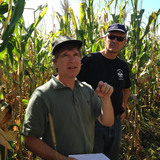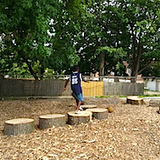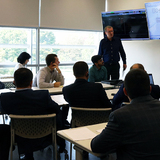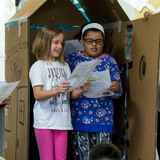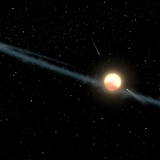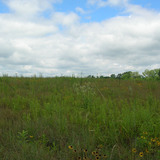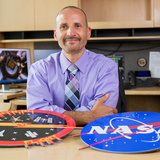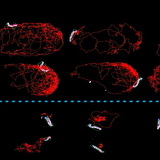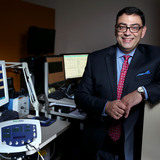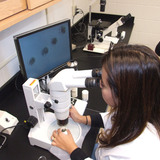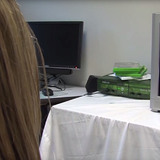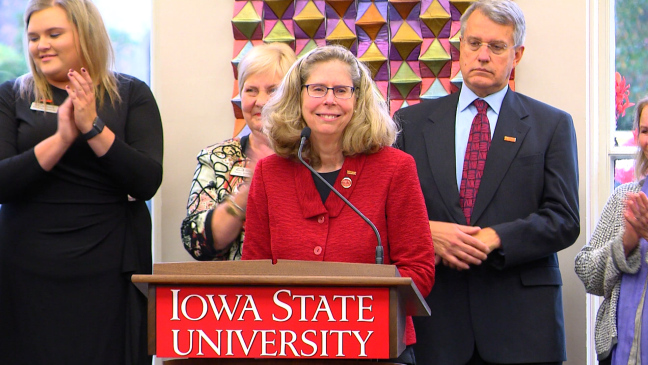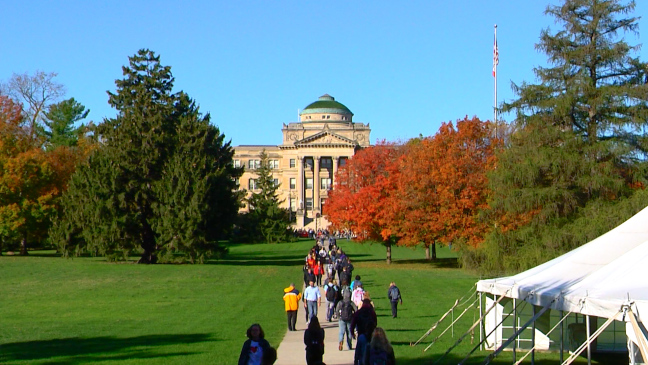News Archive
Thursday, October 26 2017
-
ISU researchers receive $1 million grant to advance organic corn genetics
A $1 million grant will help ISU researchers advance the genetics of corn varieties intended to be grown in organic settings. The project aims to improve the performance of field and sweet corn varieties in conditions unique to organic production systems.
-
Shift needed in understanding risk in play environments
Since the 1960s, there has been a trend in the United States to eliminate the risk from play environments. Teeter-totters, merry-go-rounds and monkey bars were deemed too dangerous. But danger is not the same as risk. And eliminating all risk within play eliminates creativity, challenge and discovery, says Bambi Yost, associate professor of landscape architecture at Iowa State University. She is one of an increasing number of researchers who agree that safe, risk-taking opportunities on the playground can benefit children's health and learning.
-
Tom Vilsack will speak on ag and climate change Nov. 16 at ISU
Former Secretary of Agriculture Tom Vilsack will discuss how a changing climate threatens the agriculture industry in a talk at Iowa State. “Agriculture and Climate Change” will be at 7 p.m. Thursday, Nov. 16, in the Memorial Union Great Hall. Vilsack is president and CEO of the U.S. Dairy Export Council. He served as agriculture secretary for eight years in the Obama administration, and was Iowa's governor from 1999 to 2007. His talk is part of Iowa State's National Affairs series: "When American Values Are in Conflict." It is free and open to the public.
-
Ordinance reduces violent crime near late-night bars by making owners part of solution
An ordinance requiring bar owners to beef up security helped reduce violent crime in and around late-night clubs in Little Rock, Arkansas, according to a new study led by an Iowa State University researcher. Kyle Burgason says other cities tackling crime near bars and nightclubs could take similar action with the same results.
-
Iowa State engineers help Black Sea countries fight cybersecurity threats
Iowa State University cybersecurity researchers recently presented two days of demonstrations and case studies to help four Black Sea countries fight off cyberattacks. Some 230,000 people in one of those countries -- Ukraine -- were left without electricity in December 2015 after a cyberattack took down dozens of power substations. The demonstrations at Iowa State were part of a study tour sponsored by the U.S. Agency for International Development and organized by the National Association of Regulatory Utility Commissioners.
-
MEDIA ADVISORY: Sudler Trophy presentation and proclamation
The John Philip Sousa Foundation will present the Iowa State University Cyclone Football “Varsity” Marching Band with the Sudler Trophy during halftime of the Homecoming football game on Saturday, Oct. 28. The award recognizes both the current and historical excellence of the nation’s top collegiate marching bands.
-
Wendy Wintersteen named Iowa State University president
Wendy Wintersteen's appointment concludes a nearly six-month national search for Iowa State's 16th president. Wintersteen will take office on Nov. 20, succeeding Benjamin Allen, who has served as interim president since May 8. Wintersteen led the ISU College of Agriculture and Life Sciences from 2006 until her selection as university president.
-
Financial expert and USA Today columnist Pete the Planner will speak at ISU Nov. 1
USA Today columnist and financial broadcaster Peter Dunn — known as Pete the Planner — will share his unique brand of financial planning during a talk at Iowa State. “The Economy and You: Separating the Facts from the Fiction” will be at 8 p.m. Wednesday, Nov. 1, in the Memorial Union Sun Room. Dunn's presentation is part of Iowa State's Greater Iowa Credit Union Business lecture series, and is free and open to the public.
-
Teens sacrifice sleep when they spend more time on electronic devices
The temptation to respond to social media notifications and text messages from friends is keeping more and more teens awake at night. New research from Iowa State and San Diego State universities found teens who spend more than two hours a day on their smartphones get fewer than seven hours of sleep each night.
-
ISU researchers awarded National Science Foundation grant to study “shrink-smart” communities in Iowa
Iowa State University researchers have received a one-year, $100,000 National Science Foundation planning grant to study “shrink-smart” communities in Iowa and develop tools to help all small and shrinking communities plan for population loss and mitigate its negative effects. The Iowa State project — “A Data-Driven Framework for Smart Decision-Making in Small and Shrinking Communities” — will combine data science with design and social science methodologies and community engagement processes to create an innovative, interdisciplinary research framework that can be a model for future projects.
-
"Food Evolution" documentary and discussion set for Oct. 30 at Iowa State
The documentary, "Food Evolution," which wrestles with the emotions and evidence surrounding one of the most heated arguments of our time — GMOs and food — will be shown at 7 p.m. Monday, Oct. 30, in the Memorial Union Great Hall. Alison Van Eenennaam, University of California, Davis — who appears in the film — will provide brief opening remarks and lead a discussion following the 90-minute film. It is free and open to the public.
-
You would not ask a firefighter to perform open-heart surgery
The concept of “collective intelligence” is simple – it asserts that if a team performs well on one task, it will repeat that success on other projects, regardless of the scope or focus of the work. While it sounds good in theory, it doesn’t work that way in reality, according to an Iowa State University researcher.
-
‘Maker theater’ puts the spotlight on geometry and literacy
Third graders at Edwards Elementary School combined lessons in literacy and geometry to stage a theater with sets and scripts developed with the help of Iowa State University students. Geometry and literacy were not the only lessons students gained from the experience.
-
Iowa State astronomer says star dust helps explain mysterious dimming star
Iowa State's Massimo Marengo is part of a team of astronomers working to understand the mysterious dimming of Tabby's Star. The star was found by citizen scientists who noticed unprecedented dips in the star's brightness. The unusual dimming led to a lot of potential explanations, including speculation that alien megastructures built to harvest the star’s energy were passing in front of the star. The astronomers report that space dust orbiting the star is the likely cause of the star's long-term dimming.
-
Fertilizers adjust nitrogen cycle of prairie plants, according to Iowa State University study
Excess nitrogen can change the composition of tallgrass prairies, granting an advantage to plants that flower earlier in the growing season over plants that flower later, according to new research from an Iowa State University scientist. The findings have implications for wildlife and pollinating insects that use prairie plants for habitat.
-
Iowa State University researcher finds further evidence that fats and oils help to unlock full nutritional benefits of veggies
Some dressing with your greens may help you absorb more nutrients, according to a study from an Iowa State University scientist. The research found enhanced absorption of multiple fat-soluble vitamins in addition to beta-carotene and three other carotenoids. The study appeared recently in the peer-reviewed American Journal of Clinical Nutrition, and the results may ease the guilt of countless dieters who fret about adding dressing to their salads.
-
Change Agent: Tomas Gonzalez-Torres, aerospace engineering lecturer, NASA veteran
Tomas Gonzalez-Torres, a 1998 Iowa State graduate, is back on campus after working as a NASA flight director. He's passing on some of the lessons he learned at NASA while helping students with senior design projects related to space and courses in lab techniques and computer applications.
-
Researchers demonstrate engineering approach to combine drugs, control parasitic worms
Iowa State University's Santosh Pandey helped lead a project that demonstrates an engineering technology used in cell studies can also be used for drug testing on parasitic roundworms used as a model whole organism. In this case, the technology quickly developed a cocktail of four drugs that was effective in paralyzing the roundworms. The discovery is reported in the journal Science Advances.
-
Iowa State University project: Prairie strips yield big environmental benefits
The ISU Prairie STRIPS project has found the strategic use of native prairie plants among agricultural fields yields a wide range of environmental benefits, including erosion and runoff reduction and increased wildlife habitat. The findings, published this week, draw on 10 years of data and cover dozens of environmental metrics.
-
High-intensity workouts send the wrong message, says Iowa State professor
As high-intensity interval training, or HIIT, has grown in popularity, so has the debate over whether it is an effective public health solution. An Iowa State University professor of kinesiology says the workouts are not sustainable for the majority of people who are trying to lose weight and move more.
-
Bovine embryo transfer helps ISU veterinarians improve herd genetics
Iowa State’s College of Veterinary Medicine offers students and current veterinarians opportunities to get hands-on experience with bovine embryo transfer, a growing practice that helps cattle producers pass on desirable genetics to more calves. But it requires a trained eye.
-
School, health and behavior suffer when children have TV, video games in bedroom
A new Iowa State University study is one of the first to demonstrate the consequences of allowing children to have a TV or video game system in their bedroom. Researchers found children spent less time reading, sleeping or participating in other activities when they could go in their room and watch TV or play video games. As a result, they did not do as well in school and were at greater risk for obesity and video game addiction.
